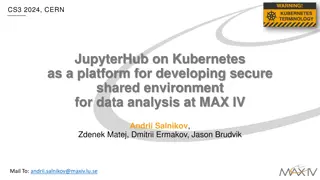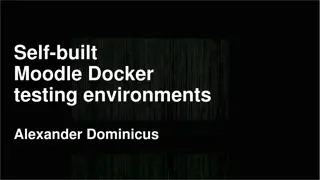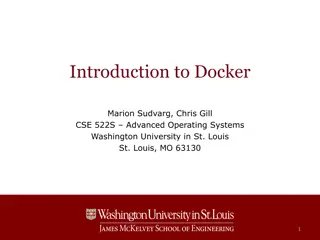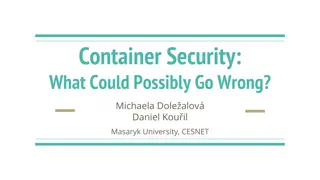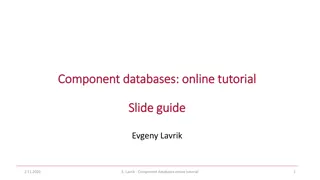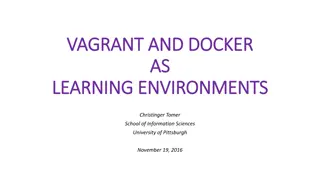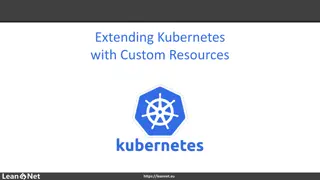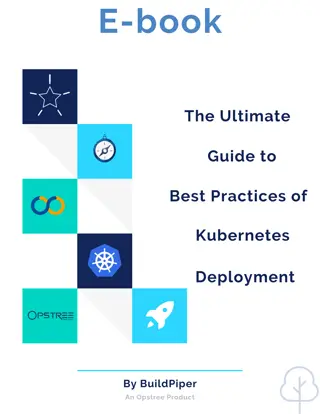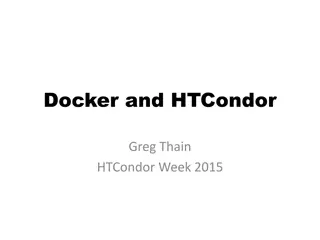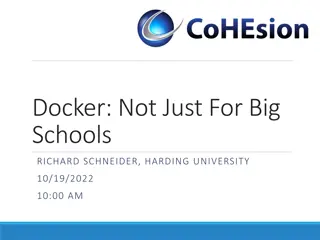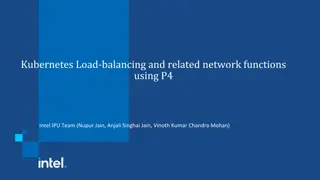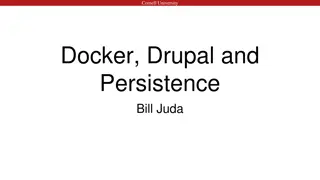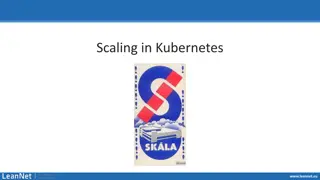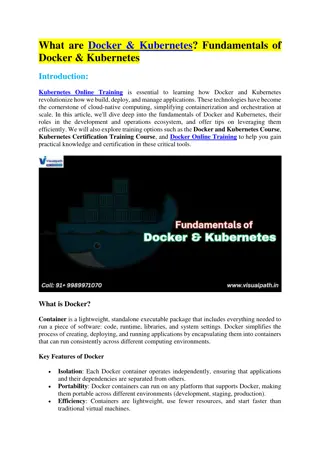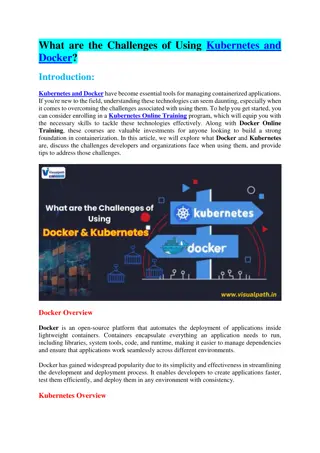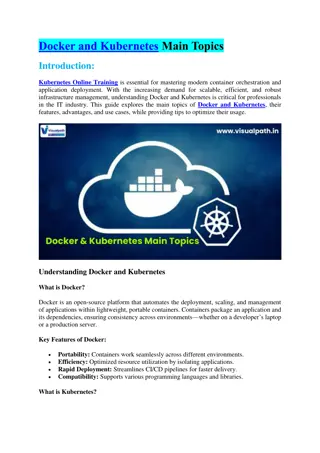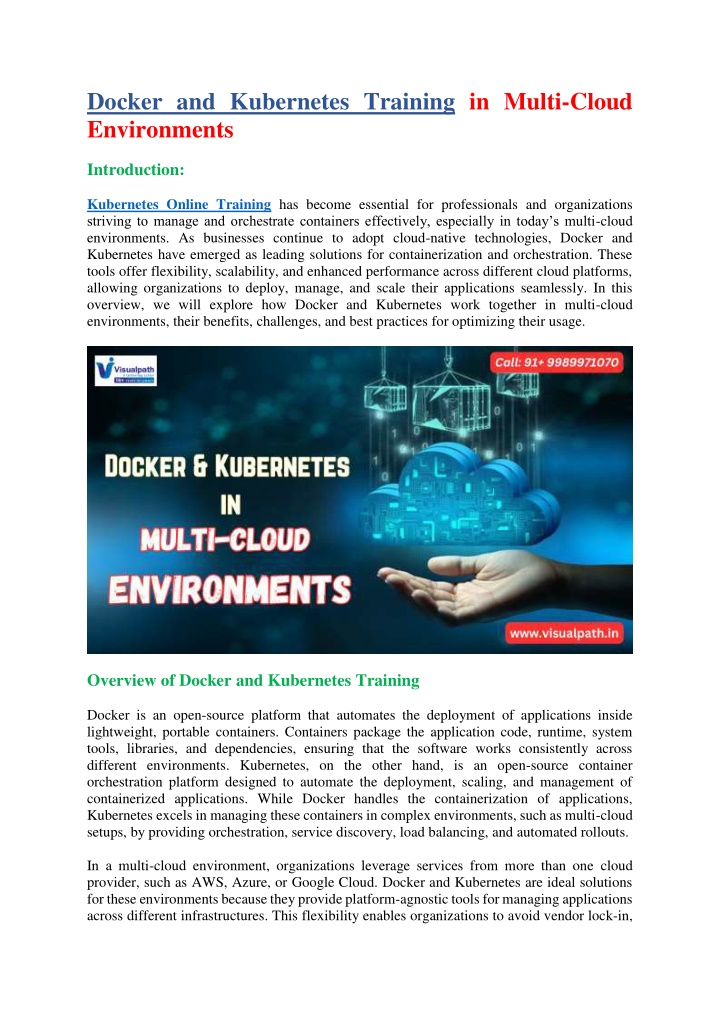
The Best Docker and Kubernetes Course - Docker Online Training
Visualpath offers premier Docker Online Training led by industry experts. Our program includes hands-on projects, Docker and Kubernetes Courses, and interview preparation. Accessible globally, including India, the USA, the UK, Canada, Dubai, and Aust
Uploaded on | 2 Views
Download Presentation

Please find below an Image/Link to download the presentation.
The content on the website is provided AS IS for your information and personal use only. It may not be sold, licensed, or shared on other websites without obtaining consent from the author. If you encounter any issues during the download, it is possible that the publisher has removed the file from their server.
You are allowed to download the files provided on this website for personal or commercial use, subject to the condition that they are used lawfully. All files are the property of their respective owners.
The content on the website is provided AS IS for your information and personal use only. It may not be sold, licensed, or shared on other websites without obtaining consent from the author.
E N D
Presentation Transcript
Docker and Kubernetes Training in Multi-Cloud Environments Introduction: Kubernetes Online Training has become essential for professionals and organizations striving to manage and orchestrate containers effectively, especially in today s multi-cloud environments. As businesses continue to adopt cloud-native technologies, Docker and Kubernetes have emerged as leading solutions for containerization and orchestration. These tools offer flexibility, scalability, and enhanced performance across different cloud platforms, allowing organizations to deploy, manage, and scale their applications seamlessly. In this overview, we will explore how Docker and Kubernetes work together in multi-cloud environments, their benefits, challenges, and best practices for optimizing their usage. Overview of Docker and Kubernetes Training Docker is an open-source platform that automates the deployment of applications inside lightweight, portable containers. Containers package the application code, runtime, system tools, libraries, and dependencies, ensuring that the software works consistently across different environments. Kubernetes, on the other hand, is an open-source container orchestration platform designed to automate the deployment, scaling, and management of containerized applications. While Docker handles the containerization of applications, Kubernetes excels in managing these containers in complex environments, such as multi-cloud setups, by providing orchestration, service discovery, load balancing, and automated rollouts. In a multi-cloud environment, organizations leverage services from more than one cloud provider, such as AWS, Azure, or Google Cloud. Docker and Kubernetes are ideal solutions for these environments because they provide platform-agnostic tools for managing applications across different infrastructures. This flexibility enables organizations to avoid vendor lock-in,
allowing them to choose the best cloud services for their specific needs. By enrolling in Kubernetes Online Training, professionals can gain a deeper understanding of how to optimize Kubernetes and Docker in such multi-cloud environments, ensuring their systems are scalable, reliable, and secure. Benefits of Docker and Kubernetes in Multi-Cloud Environments The use of Docker and Kubernetes in multi-cloud environments offers several advantages, including flexibility, cost efficiency, and risk mitigation. Firstly, using multiple cloud providers allows businesses to avoid relying too heavily on a single vendor. This prevents potential issues such as downtime or performance bottlenecks if one provider faces challenges. Docker and Kubernetes, through their robust container orchestration and management features, make it easier to deploy applications across different clouds while maintaining consistency and control over the environments. Secondly, cost optimization is a key benefit of multi-cloud strategies powered by Docker and Kubernetes. By spreading workloads across various cloud providers, organizations can take advantage of the most cost-effective services and pricing models. For example, certain applications may run more efficiently or cost less to operate on one platform than another, and Kubernetes makes it easy to distribute workloads to the best provider. Through Docker and Kubernetes Course programs, organizations can train their teams to utilize these platforms to optimize cost and performance in multi-cloud environments. Lastly, multi-cloud environments enable risk mitigation. By distributing workloads across multiple platforms, organizations can reduce the risk of service outages or disruptions. Docker containers and Kubernetes clusters allow for easy failover and recovery mechanisms, ensuring high availability and disaster recovery in case of failures. With the right Kubernetes Online Training, IT teams can learn to manage these environments with confidence, ensuring that applications remain available, scalable, and secure across multiple clouds. Challenges and Best Practices for Docker and Kubernetes in Multi-Cloud Setups While Docker and Kubernetes provide significant benefits in multi-cloud environments, there are challenges that organizations need to address. One major challenge is managing the complexity of orchestrating containers across multiple clouds, each with its own infrastructure, security policies, and management tools. Ensuring that Kubernetes clusters function seamlessly in different cloud environments requires a comprehensive understanding of how each cloud provider operates. Enrolling in a Docker and Kubernetes Course can equip professionals with the skills needed to manage this complexity. Security is another critical challenge in multi-cloud environments. Different cloud platforms have varying security models, and ensuring that Docker containers and Kubernetes clusters remain secure across these platforms requires a unified security strategy. Best practices include implementing end-to-end encryption, regular security audits, and monitoring access control policies across all cloud environments. Additionally, Docker and Kubernetes Training programs often cover advanced security practices, enabling teams to maintain security while leveraging multiple clouds. To mitigate these challenges, organizations can follow several best practices. Firstly, they should use infrastructure-as-code (IaC) tools to automate the provisioning and management of
multi-cloud environments. This ensures consistency and reduces the risk of human error. Secondly, leveraging monitoring and logging tools to track the performance of Kubernetes clusters and Docker containers across clouds is essential for maintaining system health and identifying issues before they escalate. Lastly, organizations should invest in continuous Kubernetes Online Training to ensure their teams stay updated on the latest tools and techniques for managing containers in a multi-cloud environment. Conclusion In summary, Docker and Kubernetes are critical technologies for organizations operating in multi-cloud environments. By enabling seamless container orchestration and management across different cloud providers, they offer flexibility, cost optimization, and risk mitigation. However, managing multi-cloud setups with Docker and Kubernetes requires addressing complexity, security, and consistency challenges. Investing in Kubernetes Online Training and Docker and Kubernetes Course programs is essential for organizations to fully leverage these technologies. With the right training and strategies in place, organizations can maximize the potential of their multi-cloud environments, ensuring that their applications remain scalable, secure, and efficient. Visualpath is the Best Software Online Training Institute in Hyderabad. Avail complete Docker and Kubernetes worldwide. You will get the best course at an affordable cost. Attend Free Demo Call on - +91-9989971070. WhatsApp: https://www.whatsapp.com/catalog/919989971070/ Visit:https://www.visualpath.in/online-docker-and-kubernetes-training.html Visit Our New Course:https://www.visualpath.in/online-best-cyber-security- courses.html

